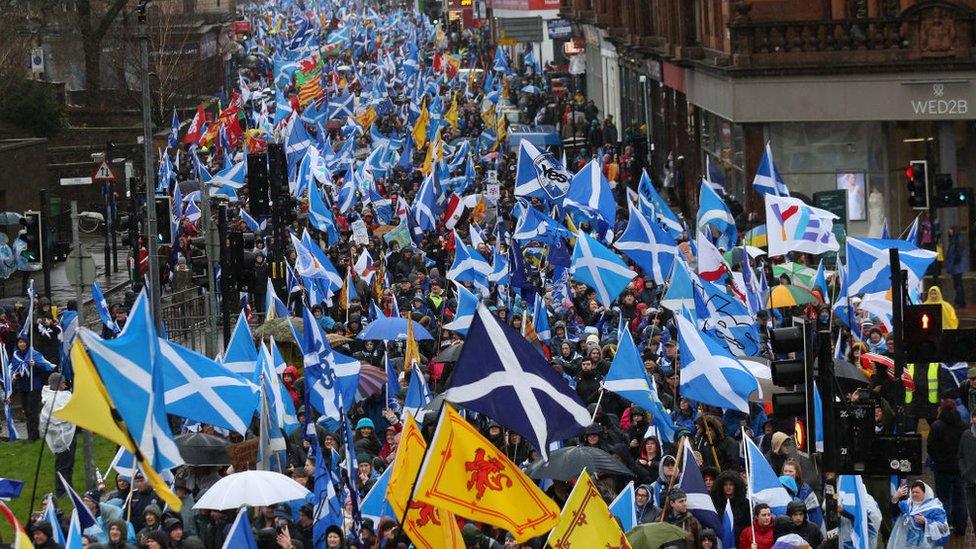Border poll would be 'absolutely reckless', says Arlene Foster
- Published
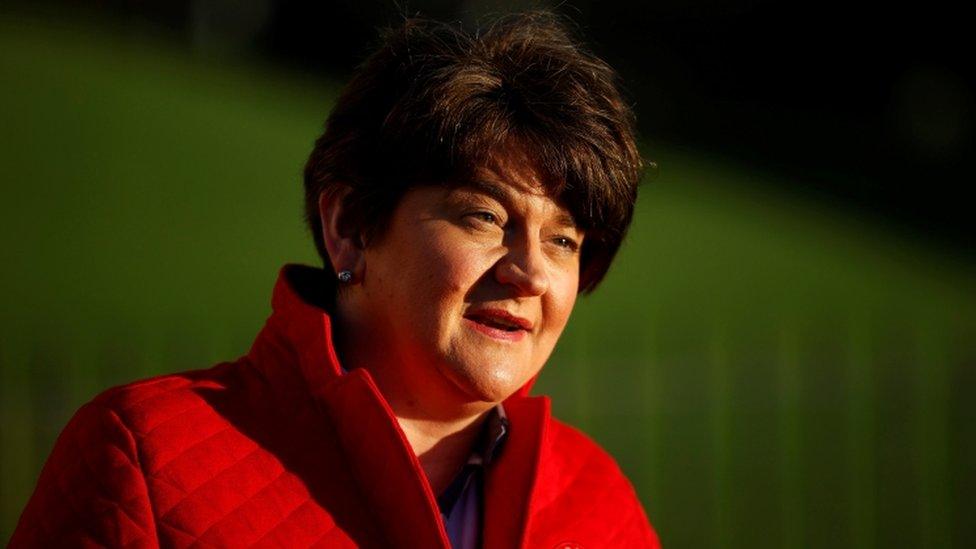
DUP leader Arlene Foster said people in NI need to "come together to fight against Covid"
DUP leader Arlene Foster has said a potential vote on a united Ireland would be "absolutely reckless".
She was speaking after a poll commissioned by the Sunday Times, external in NI found 51% of people want a referendum on Irish unity in the next five years.
Speaking to Sky News, the first minister said "we all know how divisive a border poll would be".
Sinn Féin's Michelle O'Neill said there was an "unstoppable conversation under way" on the issue.
The deputy first minister called on the Irish government "to step up preparations" for a border poll.
Provisions for a possible border poll on Irish reunification are included in the the Good Friday Agreement - the deal which led to peace in Northern Ireland after decades of violence.
It states that the Northern Ireland Secretary must call a border poll if it at any time it appears "likely" to that a majority of people in Northern Ireland would vote for a united Ireland.
Allow X content?
This article contains content provided by X. We ask for your permission before anything is loaded, as they may be using cookies and other technologies. You may want to read X’s cookie policy, external and privacy policy, external before accepting. To view this content choose ‘accept and continue’.
Mrs Foster said she thought it was "very disappointing" that some nationalist parties in the UK were focusing on "constitutional politics" during the Covid-19 pandemic.
"We all know how divisive a border poll would be, and for us in Northern Ireland what we have to do is come together to fight against Covid, and not be distracted by what would be absolutely reckless at this time," she said.
She added if there was a vote on Irish unity, the arguments for the union are "rational, logical, and they will win through".
The polling was carried out by Lucidtalk in Northern Ireland, with similar polling in England, Scotland and Wales to gauge attitudes towards the union.
It found that in Northern Ireland, 47% still want to remain in the UK, with 42% in favour of a united Ireland and 11% undecided.
However for those aged under 45, supporters of Irish reunification outnumber those who want to stay in the UK by 47% to 46%.
Respondents also said they believed there would be a united Ireland within 10 years, by a margin of 48% to 44%.

Brexit feeding into figures

Polls like this come with the usual health warning - they are a snapshot in a moment in time.
Nonetheless there is some interesting reading here - not least the fact that it paints a picture of a disunited kingdom.
We shouldn't really be surprised about that because we have had very different approaches to the global Covid-19 pandemic with different outcomes.
We know that Brexit is starting to bite and there is a lot of frustration out there and uncertainty and that, I'm sure, has fed into these figures.
The big question for NI, unsurprisingly, is around constitutional change.
It shows that 51% of those polled would want to see a border poll within the next five years, compared to 44% who would not.
However, if they flip that question around it's interesting to see that 42% would want to see a united Ireland, but 47% would want to remain, with 11% of don't knows.
So according to these figures there may be an appetite for a border poll - but if that question was posed the majority are saying they would stay in the UK.

'New future together'
SDLP leader Colum Eastwood said the poll placed a "solemn obligation" on those seeking a united Ireland "to engage with every community, sector and generation".
"The United Kingdom may be coming to an end but we are all called to build a new future together. That's the work the SDLP is engaged in," said the Foyle MP.
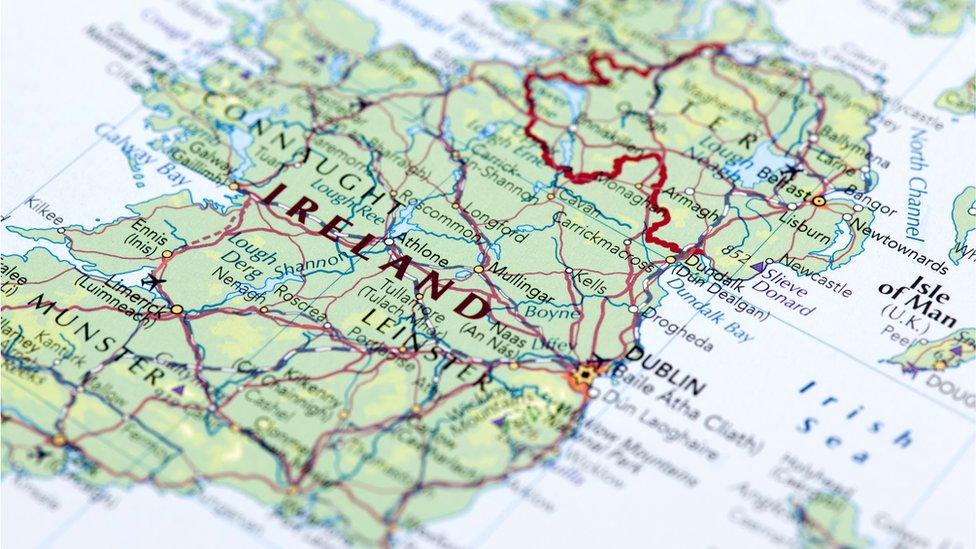
The polling found 47% of people in Northern Ireland wish to remain in the UK, with 42% in favour of a united Ireland, and 11% undecided
Ulster Unionist leader Steve Aiken said "all political energy should be focused on making Northern Ireland a better place to live and work rather than a divisive border poll".
"We need to concentrate on the here and now, fostering better relationships and plotting a way through and out of the Covid-19 pandemic," he added.
"As Northern Ireland enters its second century, we should be talking about recovery, renewal and reconciliation."
Scottish independence
The polls also found across the UK, respondents believed Scotland would become independent within the next 10 years.
In Scotland, it found a large poll lead for the Scottish National Party, with them potentially being on course to win 70 of 129 seats in Holyrood.
The SNP is set to reveal its 'roadmap to a referendum' to its national assembly on Sunday.
It outlines plans to pursue a vote after the pandemic if there is a pro-independence majority at Holyrood following May's election.
The research was carried out by Lucidtalk in Northern Ireland, Panelbase in Scotland, and YouGov in England and Wales.
The polling was carried out between 15 and 22 of January, with 2,392 people polled in Northern Ireland, 1,206 in Scotland, 1,416 in England, and 1,059 in Wales.
- Published27 February 2020
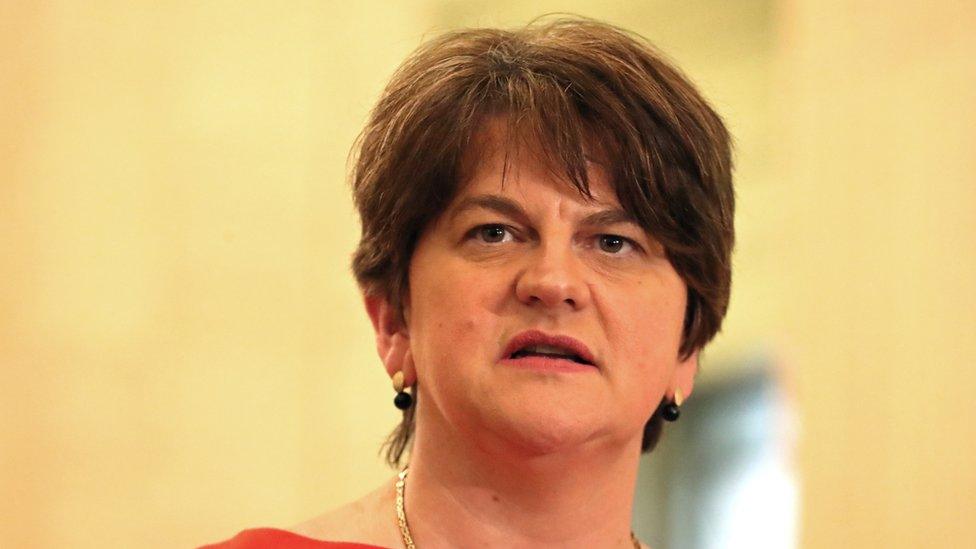
- Published24 May 2019
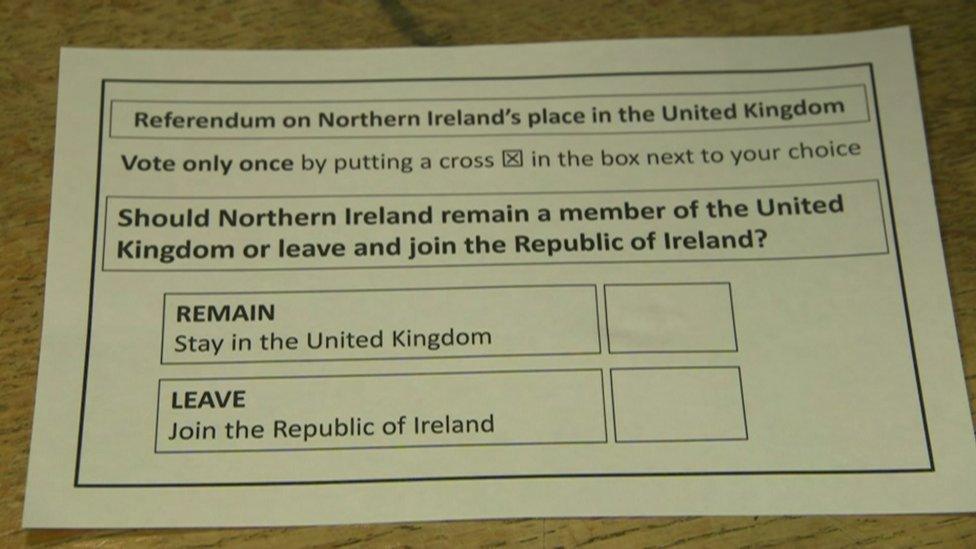
- Published24 January 2021
